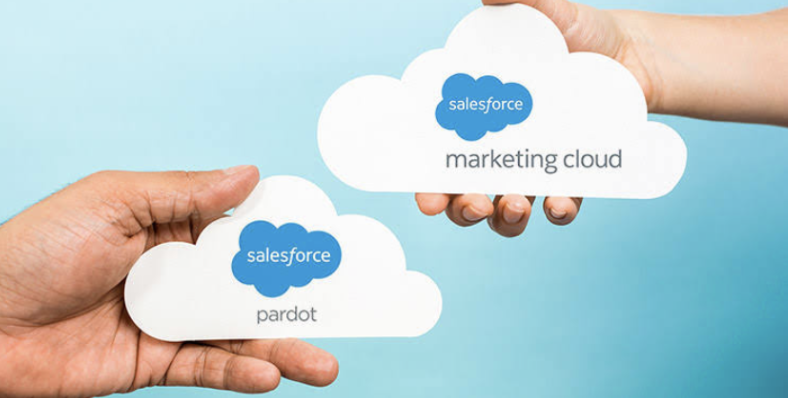Marketing Cloud Vs. Pardot

Pardot and Marketing Cloud have been the top Salesforce marketing automation technologies since 2013. According to Infoclutch.com and Enlyft.com, more than 37,000 firms had connected Pardot with Salesforce by 2022, and over 22,000 had or were utilizing Marketing Cloud.
Both are intended to improve marketing methods, although they address distinct requirements and functionalities. This blog will look at the fundamental differences between Marketing Cloud and Pardot to help you decide which solution is better for your organization.

What is Salesforce Marketing Cloud?
Salesforce Marketing Cloud is a marketing solution that provides an organization with a set of tools to engage and analyze the customers’ data across the entire marketing funnel. It is built to deal with different types of marketing and possesses the instruments for interacting with customers through e-mail, social networks, ads, and others. You can also have Salesforce Marketing Cloud Training to learn in detail about it.
Key Features of Marketing Cloud
- Email Marketing:
Email marketing, in particular, is very profound, with different filters for sending out emails and drip marketing campaigns. This means you can automatically send messages according to the shopping behavior, liking and preferences of the customer.
- Journey Builder:
It provides the capability of mapping out customer journeys and how the interactions occur in the various channels. They allow for customizing communications based on particular user actions, enabling a smooth experience for the user throughout the customer journey.
- Social Media Management:
Through Social Studio, Marketing Cloud is also able to track and engage customers on your social media pages. You can post updates, reply to fans, and monitor social media results in order to fine-tune social campaigns.
- Advertising Studio:
It is a marketing tool used to plan, implement, and track paid advertisements on the website, social media, search engines, display ads, etc. It helps to monitor the efficiency of the advertisements posted and change tactics if necessary.
- Analytics and Reporting:
Marketing Cloud offers analytical and reporting tools that can be used to analyze the efficiency of the campaigns. It is also easy to monitor parameters such as engagement, conversion, as well as ROI levels, meaning that you’d be making informed decisions.
- Customer Data Platform (CDP):
The CDP integrates customer data from multiple sources, giving you a single view of customer engagement. This facilitates the identification of your customers more closely and markets them appropriately.
What is Salesforce Pardot?
Salesforce Pardot is a marketing automation tool perfect for B2B marketing because it targets businesses as their market. This model is centered on the processes of lead capturing, qualifying, and nurturing together with the coordination of the work of the sales and marketing departments. Pardot also assists businesses in determining marketing automation procedures that will enhance their lead conversion ratios.
Key Features of Pardot
- Lead Management:
Pardot offers methods for grabbing and rating leads, as well as guiding their progression. This also enables you to communicate with the leads according to their actions. Also, set up date-driven workflows that can assist in moving the leads through the funnel.
- Email Marketing:
Pardot has onboard B2B marketing-specific email marketing tools. You can send direct emails and newsletters, segment the audience, and use automatic responders.
- Lead Scoring and Grading:
Lead scoring and grading in Pardot is a system that goes through the leads in order to determine if they are a good match or not. This assists in ranking leads and makes it possible for the salespeople to concentrate on the most probable clients.
- Marketing Automation:
With Pardot, you can set up marketing automation that will help to manage, nurture and convert leads. It can detect the lead behavior and set up the right triggers and follow-up actions.
- Analytics and Reporting:
Pardot offers analyzing and reporting features to help organizations measure the performance of their marketing programs. It is possible to track lead activity, campaign performance, and other aspects of your marketing campaigns, obtaining useful data on your ultimate ROI.
- Integration with Salesforce:
Pardot also links closely with the Salesforce CRM, which allows users to have a complete view of the leads and marketing interactions. This integration helps in proper coordination between the marketing and sales departments, which in turn increases efficiency.
Read: Time Management Strategies for a Balanced College Life
Marketing Cloud VS Pardot
Marketing Cloud and Pardot are immensely capable solutions; however, they are used in distinct roles. Below is a comprehensive comparison to assist you in distinguishing the two tools and deciding on the one suitable for your enterprise:
1. Target Audience:
- Marketing Cloud: Marketing Cloud would be most beneficial for Business-to-Consumer (B2C) organizations that require elaborate marketing solutions. This is suitable for organizations that have customers who need to be reached through multiple channels using a single unified strategy.
- Pardot: Pardot has B2B (business-to-business) organizations that primarily concentrate on generating, developing, and moving leads through the sales cycle. This is especially suitable for companies that consider leads important and require features for managing sales and marketing.
2. Features and Capabilities:
- Marketing Cloud: Provides all-in-one functionality like e-mail marketing, social media posts, and detailed statistics. It offers an integrated platform for executing and monitoring the various marketing channels, as well as analyzing customer engagement.
- Pardot: Specializes in the areas of leads management and marketing automation. Its features are tailored to assist companies in obtaining, cultivating, and converting leads and emphasize marketing-sales sync.
3. Email Marketing:
- Marketing Cloud: Offers more powerful email marketing features that allow detailed customization, targeted audience, and customization. The tools enable the creation of specific email marketing campaigns and even monitor the results on different platforms.
- Pardot: Provides email marketing solutions with automation capabilities for lead nurturing and communication. It can allow you to share messages with leads and monitor how they respond to them, although not as centralized across multiple platforms as in Marketing Cloud.
4. Automation:
- Marketing Cloud: Includes Journey Builder, which lets marketers design and manage multi-channel communications based on the recipients’ actions. This offers great flexibility and customization to the management of customer interaction.
- Pardot: Offers tools for maintaining, tracking, and scoring the sales leads. Its workflows are similar to Salesforce marketing cloud’s lead nurturing process. It is responsible for automating lead management processes and transferring them through the funnel but with more of a focus than Journey Builder.
5. Social Media:
- Marketing Cloud: Consists of Social Studio for monitoring and analyzing social media related to the execution of social media campaigns. It allows you to calendar posts, respond to followers’ comments as well as monitor the overall social media effectiveness in various networks.
- Pardot: The software does not have specific features for managing social media. It is more sales-oriented, with less focus given to social media communication.
6. Analytics and Reporting:
- Marketing Cloud: Provides detailed tracking and analysis of marketing communications delivered through various media. It will give you the ability to monitor details about campaign success, customer engagement, and marketing efficiency.
- Pardot: It offers ‘reporting and analytics’ that focus on lead management and marketing automation. It is based on the measures related to lead activity, campaign performance and return on investment.
7. Integration:
- Marketing Cloud: Works with other Salesforce offerings and other tools, which gives a unified picture of the customer’s experience and information. It has a good level of integration possibilities to interact with other marketing and sales applications.
- Pardot: Fully compatible with Salesforce CRM; leads and marketing activities are easily accessible within the CRM platform. It also aligns the goals of the marketing and sales departments, which is critical in any organization.
8. Customer Data Platform (CDP):
- Marketing Cloud: Features a CDP for customer data aggregation and organizing data collected across a host of channels. This leads to an integrated perspective on customers and assists in the personalization of the marketing processes.
- Pardot: It does not have a CDP; instead, it is a platform for lead management and automation in the Salesforce environment. The data is handled within the framework of call identification and interaction with the CRM system.
Choosing the Right Tool
Some of the factors that will help you choose between Marketing Cloud and Pardot include the following: Here are some factors to consider when making your choice:
1. Business Model:
- B2C Companies: If your business is BM obsessed with consumer marketing applications together with multichannel, then it would probably be better off with Marketing Cloud. It provides a wide range of features for handling client relations through different types of communication channels.
- B2B Companies: If you aim at generating and nurturing leads as well as sales and marketing synchronization, Pardot will be better for you. One is that it has tools for handling and converting leads that may be specific to the business.
2. Marketing Complexity:
- Complex Campaigns: For organizations with highly sophisticated marketing campaigns that are executed across multiple platforms, Marketing Cloud provides additional capabilities and customization. It is most suitable for handling complex marketing initiatives and comprehending consumer engagement.
- Lead Management: If companies are interested in tracking, scoring and following leads, nurturing and converting them, then Pardot has developed tools to cater to this effectively. Some of them are built particularly for the B2B marketing process.
3. Budget:
- Higher Budget: If you are ready to invest more money and need a complex marketing tool, it is possible to pay for Marketing Cloud’s functions. It provides numerous tools and features for analyzing multifaceted marketing plans.
- Focused Budget: If you desire a more focused budget or certain specified requirements in lead management, Pardot may provide solutions at less cost. It offers targeting elements relating to B2B marketing specialty, as well as lead management features.
Conclusion
Salesforce Marketing Cloud and Pardot and Lead are both very useful in marketing, but they are very different. Marketing Cloud is better suited for multi-channel marketing and customer communications, which is helpful for B2C organizations particularly if they have highly intricate marketing strategies. Whereas Pardot was specifically built for B2B companies targeting leads in the market for nurture.
Identifying the special features that characterize your business will assist you in selecting the ideal tool. Another factor to consider when deciding between different marketing strategies is the marketing goals and objectives involved, the target audience, and the budget for the campaign. In this case, it is clear that Marketing Cloud and Pardot have their advantages and disadvantages, and the choice will depend on their correspondence to the tasks performed.
